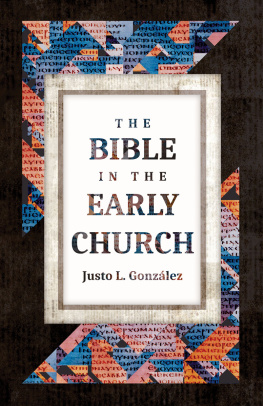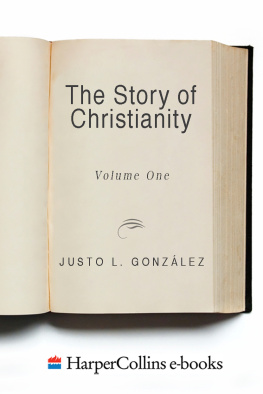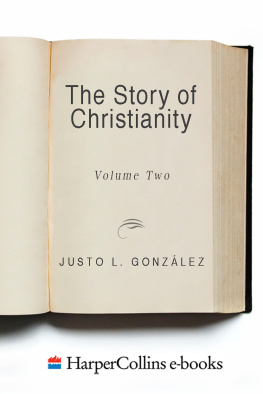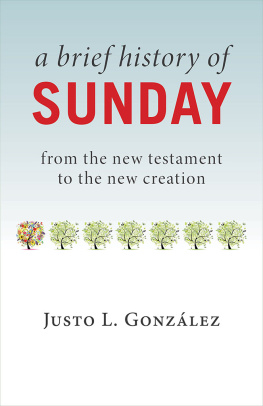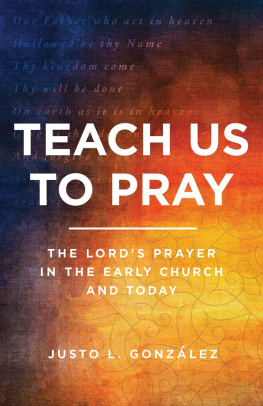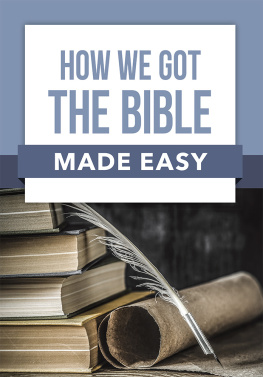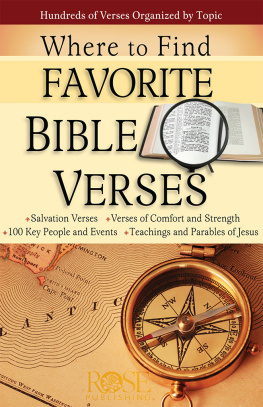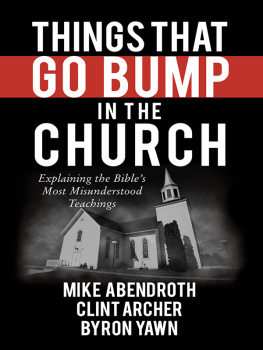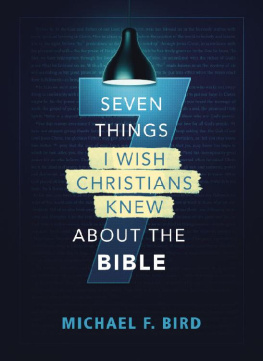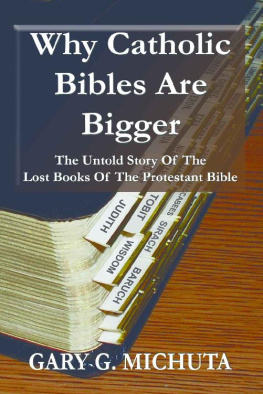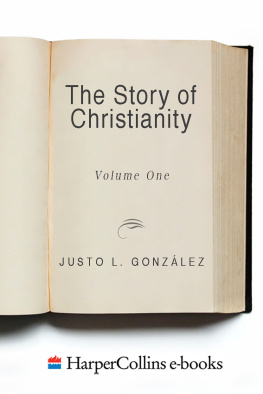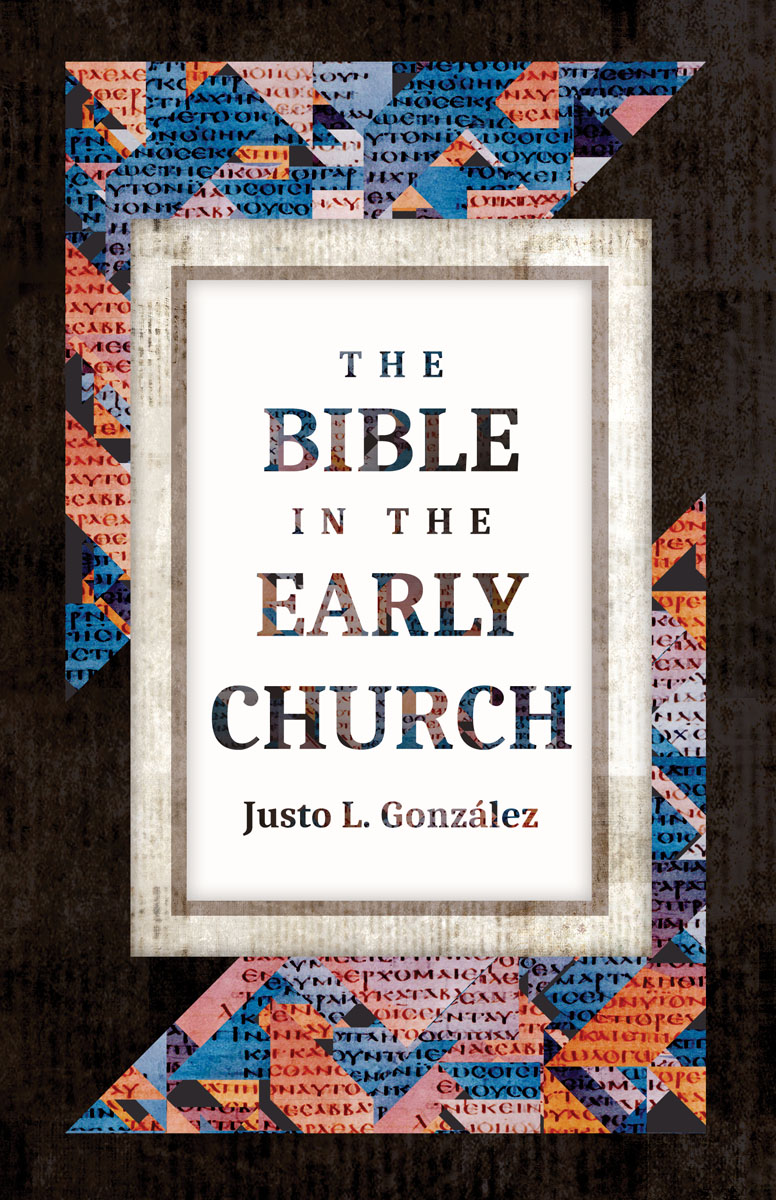
This is the best introduction to the Bible in the early church currently available. In clear and accessible prose, Gonzlez surveys the Bible as a physical artifact, its uses in various settings, and the different ways it was interpreted by its earliest readers. The Bible in the Early Church is both conversational and dependable, hallmarks of Gonzlezs scholarship over the decades. The book is ideally suited for general readers and undergraduate classrooms.
Peter W. Martens
professor of early Christianity at Saint Louis University
Finally. A book on the Bible in early Christianity that answers the important questions that everyone asks and does it in a way that everyone will want to read. This is Gonzlez at his best. He cuts to the chase, anticipates our queries, leads us to the best of the primary sources, gives us enough, but not too much, and does it all in the genre of bedtime story.
D. Jeffrey Bingham
professor of historical theology at Southwestern Baptist Theological Seminary
Reading The Bible in the Early Church is like being transported across time to experience Scripture the way the first believers would have encountered it. In this excellent, accessible book, Justo Gonzlez allows us to see the Bible come together before our eyes from separate scrolls, to codices, to the printing press. But he doesnt stop there; he immerses us in the world of early Christians to show us what their relationship with Scripture was like in everyday practice, worship, and interpretation. This book is a wonderful introductory resource that fosters gratitude for the generations that preserved and passed down the Bible to us.
Karen R. Keen
founder of the Redwood Center for Spiritual Care and Education, Garland, Texas
Justo L. Gonzlez has gifted us in The Bible in the Early Church with a very personal, clear, and erudite introduction to the writing, use, and transmission of the biblical text for the life of the church. He explains from a historical and faith framework the special place and function of the Bible in the worship, education, and social order of the church. He enlightens us also concerning models of interpretation used in the past to understand three crucial themes in Scripture: creation, the exodus, and the Word. Dr. Gonzlez hopes that the lessons learned from this past may be transformed into new lessons for the future. This book should be a most welcome addition to introductory courses on the Bible in theological schools and universities as well as in parochial settings.
Alberto L. Garca
professor emeritus of theology at Concordia University Wisconsin
Wm. B. Eerdmans Publishing Co.
4035 Park East Court SE, Grand Rapids, Michigan 49546
www.eerdmans.com
2022 Justo L. Gonzlez
All rights reserved
Published 2022
Printed in the United States of America
28 27 26 25 24 23 22 1 2 3 4 5 6 7
ISBN 978-0-8028-8174-8
Library of Congress Cataloging-in-Publication Data
Names: Gonzlez, Justo L., author.
Title: The Bible in the early church / Justo L. Gonzlez.
Description: Grand Rapids, Michigan : William B. Eerdmans Publishing Company, 2022. | Includes bibliographical references and index. | Summary: A concise history of the Bible with a focus on its composition and use within the early churchProvided by publisher.
Identifiers: LCCN 2021041066 | ISBN 9780802881748
Subjects: LCSH: BibleHistory. | BibleUse. | BibleCriticism, interpretation, etc. | BISAC: RELIGION / Christianity / History | RELIGION / Christian Living / General
Classification: LCC BS445 .G65 2022 | DDC 220.95dc23
LC record available at https://lccn.loc.gov/2021041066
Unless otherwise noted, Scripture quotations are from the New Revised Standard Version of the Bible.
Contents
Preface
A lthough I do not say so explicitly in the following pages, this book is largely autobiographical. My interest in writing about how the Bible has been seen, read, interpreted, and lived in the past stems from the Bible itself having been my companion throughout the yearsmy companion in different stages of life and of faith. One of the cherished memories of my childhood is an always open Bible on the sideboard behind my dads place at the table in the dining room. I also remember a few years later going to church with my family, each one of us carrying a Bible. Mine was almost as big as I was! And I remember my grandfather teaching me to read before entering school, doing so with the Bible. Therefore, I can truthfully say that the first book I ever read was the Bible. Years went by, and, now a teenager in a time of great enmity between Catholics and Protestants in my country, one of my favorite pastimes with some of my friends was to challenge a priest or nun to debate over the Bible. At other times, with much better judgment, I allowed the Bible to challenge me. More years went by, and in seminary I learned about many instruments for the study and interpretation of the Biblelanguages, commentaries, and the like. Many more years have gone by, and, with the Bible again often open on the desk of my office, as it was in my childhood home, I have written a number of commentaries and other pieces on various aspects of the Bible.
Therefore, I can say that in one way or another, the Bible has always been with me. Sometimes I have followed it; sometimes I have not. Sometimes I have understood it, sometimes not. But it has always been there.
Now well into the ninth decade of my life, I write these lines about the book that has always been my companion. I have written these pages at a time of deep anxiety for all humankind. A frightening pandemic encircles the globe. Nations that were once at war now face a common enemy. Those who used to compete with one another now have to collaborate. Current events have made it clear that the Bible was always rightthat, as Paul declared in Athens, God made all nations to inhabit the whole earth (Acts 17:26). In a word, no matter whether we like it or not, we have discovered once again that we are all related and that we are all responsible for one another.
Quite possibly when someone reads these words, the pandemic of 2020 will have passed. Perhaps its consequences will have been as catastrophic as we now fear; perhaps not. But of one thing we may be certain: generations pass, nations pass, ideologies pass, pandemics pass but this Bible that has accompanied me from my childhood shall not pass.
With that certainty, just in case you may be reading these pages at a time of contagious anxiety such as the world is now living in in 2020, I leave you with the words of the Spanish poet and mystic Teresa of Avila (in a translation by E. Allison Peers):
Let nothing disturb thee;
Let nothing dismay thee:
All things pass;
God never changes.
Patience attains
All that it strives for.
He who has God
Finds he lacks nothing:
God alone suffices.
J. L. G.
Decatur, GA
Abbreviations
ANF The Ante-Nicene Fathers
BAC Biblioteca de autores cristianos
FC Fathers of the Church
Mansi Sacrorum conciliorum amplissima collectio
NPNF1 The Nicene and Post-Nicene Fathers , Series 1
NPNF2 The Nicene and Post-Nicene Fathers , Series 2
PG Patrologia Graeca, Migne
PL Patrologia Latina, Migne
When referring to any of these series, the volume number is followed by a colon, and then the page or column number(s). For instance, ANF 5:200 means volume 5 of that series, page 200.
Next page
